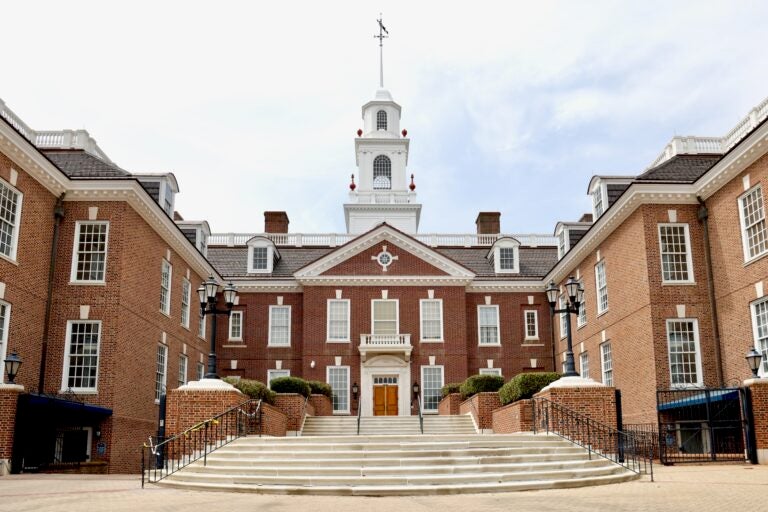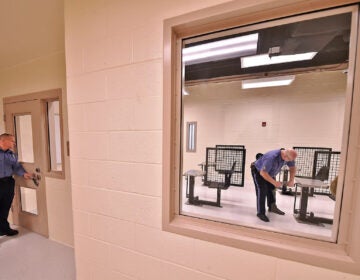‘Somebody’s in trouble’: Legislative committee hearing on Delaware property reassessments probes lack of data sharing and delay in release of tax notices
New Castle County says the prior administration was advised to send out the new property values last summer, not in mid-November.
Listen 1:01
Legislative Hall in Dover, Delaware (Emma Lee/WHYY)
What are journalists missing from the state of Delaware? What would you most like WHYY News to cover? Let us know.
“I think it’s important that we’re honest with ourselves and each other with respect to the consequences of some of the choices that led us to where we are today,” New Castle County Executive Marcus Henry said to a working group of Delaware lawmakers.
Tuesday was the first of several legislative hearings on the property reassessment process and fixing the confusion caused by the once-in-40-year property assessments. The committee heard presentations from Henry, the city of Wilmington and appraisal company Tyler Technologies.
Homeowners throughout the state face increases of up to thousands of dollars in county and school taxes after property values were reassessed for the first time in decades. But the public outcry over the spikes was particularly fervent in New Castle County — where the tax burden shifted to homeowners — as commercial property values decreased on average while home values increased.
New Castle County has spent $20 million so far to hire Tyler Technologies, the contractor that evaluated the parcels in all three counties. Tyler said it was not part of its analysis to consider the tax burden.
Henry said the average residential assessments in New Castle County rose by 477% and average non-residential evaluations went up 233%.
“People are struggling under the weight of this economy currently and we have a responsibility to help them,” the county executive said. “Not to punish them due to over four decades of delay in conducting a county-wide reassessment.”
Senate Majority Leader Bryan Townsend said one goal of the hearing is to consider ways lawmakers could create a legislative framework that could take effect next year, not in a few years when the next reassessment would be due.
The task force was created as part of a series of several bills state lawmakers passed in an August special session.
One of those new laws allows school districts to split their rates for residential and non-residential properties, similar to what the county and Wilmington officials did. That change is now the subject of a lawsuit by landlords against the state, the county and six school districts who say it is unconstitutional and violates their due process rights.
Wilmington argues many of Tyler’s property appraisals are wrong
The city of Wilmington is planning to do interior assessments of homes, especially focusing on low-income neighborhoods, where the property tax assessments rose by 200% or more. The city also extended its tax deadline to Oct. 31.
Mayor John Carney’s Chief of Staff Cerron Cade said the valuations are inaccurate because some of these neighborhoods have homes that investors have rehabbed next door to houses with no updates.
“Our homes aren’t necessarily all built at one time. They spread across different eras and decades throughout the city, and it’s very complicated to try to do a mass appraisal already,” he said. “You add on top of that the lack of internal data for those homes and the unique environment where properties are being flipped in some of these more depressed neighborhoods and you have kind of a perfect storm.”
Henry appeared to throw cold water on the city’s plan, saying that the county doesn’t have a legal way to revise assessed values outside of what is “vaguely” enumerated in Delaware code and the appeal process.
Questioning reveals city data was not shared with Tyler
The special committee went on a fact-finding pursuit, with questions aimed at revealing what happened, what went wrong and who was to blame.
Officials with Tyler Technologies gave a presentation on how they determined property values, defending their approach to conducting the mass appraisal. They said their methods meet industry standards.
The company used cost, sales comparison and income data. Tyler also defended the accuracy and fairness of its data, even though it admitted it did not have city permitting and building inspection data.
Aaron Goldstein, the attorney for the county, said city permitting data was routinely shared with the county until it stopped, likely during the pandemic.
Tyler officials said they voiced concerns to the county about the lack of data around 70 times, dating back to 2022.
House Speaker Melissa “Mimi” Minor-Brown said she’s concerned that after Tyler notified that it needed that data multiple times, nothing happened.
“At the end of the day, it impacts people’s lives, people’s finances, people’s housing, people’s quality of life,” she said. “Somebody’s in trouble.”
Michael McFarlane, a Tyler regional manager, argued that widespread differences in valuations in the city being over an acceptable threshold doesn’t mean that individual parcels are assessed incorrectly.
New Castle County staff pushed for notices to go out before November
State lawmakers also questioned why the county did not send out tentative property value notices until mid-November 2024. Now-Gov. Matt Meyer, who was the previous county executive, was running for governor in last year’s election.
New Castle County Executive Henry said it was his team’s understanding that the county’s assessment staff recommended several times that tentative value notices go out in the summer of 2024, but Meyer’s administration said no to those recommendations.
“Instead, the assessment office was advised that tentative value notices couldn’t go out until mid-November,” he said. “Accordingly, in mid-November 2024, Tyler mailed those notices of tentative value to property owners.”
Meyer’s office did not respond to a request for comment.
Some lawmakers on the special committee grew frustrated with the answers from Tyler Technologies. McFarlane and Jake Wilson, a senior vice president, said they could only speak in generalities and kept referring questions back to Tyler’s client New Castle County and the other counties. Some of the committee members also expressed frustration over Tyler’s lack of specificity when asked about how agricultural land and non-residential properties like apartment buildings were valued.
State Sen. Dan Cruce, D-Wilmington, said he was disappointed in their responses.
“I’m not sure if you all have had this type of feedback in other states or other locations,” he said. “If you haven’t, welcome to Delaware. This is not how we play ball here. It’s completely unsatisfactory to hear some of the ‘We can’t answer those questions. We don’t have specifics.’”
New Castle County and the city of Wilmington gave Delaware lawmakers suggestions for fixing the confusion caused by the once-in-40-year property assessments. The county proposed amending state law to clearly define “fair market value” and tax liability “errors.” The city recommended standardizing the rules for property value appeals and making the effective date of reassessments one year from the date they’re finished.
The next committee hearing is scheduled for Oct. 7.
This story was supported by a statehouse coverage grant from the Corporation for Public Broadcasting.

Get daily updates from WHYY News!
WHYY is your source for fact-based, in-depth journalism and information. As a nonprofit organization, we rely on financial support from readers like you. Please give today.







